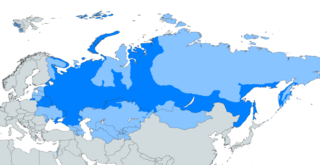
Russian language
East Slavic language / From Wikipedia, the free encyclopedia
Dear Wikiwand AI, let's keep it short by simply answering these key questions:
Can you list the top facts and stats about Russian language?
Summarize this article for a 10 years old
Russian[lower-alpha 8] is an East Slavic language, spoken primarily in Russia. It is the native language of the Russians and belongs to the Indo-European language family. It is one of four living East Slavic languages,[lower-alpha 9] and is also a part of the larger Balto-Slavic languages. It was the de facto and de jure[24] official language of the former Soviet Union.[25] Russian has remained an official language in independent Russia, Belarus, Kazakhstan, and Kyrgyzstan, and is still commonly used as a lingua franca in Ukraine, the Caucasus, Central Asia, and to a lesser extent in the Baltic states and Israel.[26][27][28][29]
| Russian | |
|---|---|
| русский язык[lower-alpha 1] | |
| Pronunciation | [ˈruskʲɪi̯ jɪˈzɨk] ⓘ |
| Native to | Russia, other areas of the former Soviet Union |
| Region | Russian-speaking world |
| Ethnicity | Russians |
Native speakers | L1: 150 million (2020 census)[1] L2: 110 million (2020 census)[1] |
Early forms | |
| Dialects |
|
| Cyrillic (Russian alphabet) Russian Braille | |
| Official status | |
Official language in |
As inter-ethnic language but with no official status, or as official on regional level
|
Recognised minority language in | |
| Regulated by | Russian Language Institute[22] at the Russian Academy of Sciences |
| Language codes | |
| ISO 639-1 | ru |
| ISO 639-2 | rus |
| ISO 639-3 | rus |
| Glottolog | russ1263 |
| Linguasphere | 53-AAA-ea < 53-AAA-e |
 Russian is a majority language Russian is a minority language | |
Russian has over 258 million total speakers worldwide.[30] It is the most spoken Slavic language,[31] and the most spoken native language in Europe,[32] as well as the most geographically widespread language of Eurasia.[31] It is the world's seventh-most spoken language by number of native speakers, and the world's eighth-most spoken language by total number of speakers.[33] Russian is one of two official languages aboard the International Space Station,[34] as well as one of the six official languages of the United Nations.[35]
Russian is written using the Russian alphabet of the Cyrillic script; it distinguishes between consonant phonemes with palatal secondary articulation and those without—the so-called "soft" and "hard" sounds. Almost every consonant has a hard or soft counterpart, and the distinction is a prominent feature of the language. Another important aspect is the reduction of unstressed vowels. Stress, which is often unpredictable, is not normally indicated orthographically,[36] though an optional acute accent may be used to mark stress – such as to distinguish between homographic words (e.g. замо́к (zamók, 'lock') and за́мок (zámok, 'castle')), or to indicate the proper pronunciation of uncommon words or names.